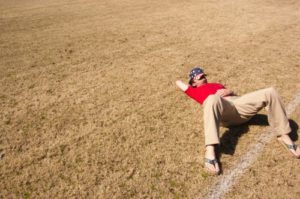 Sleep is a key factor in recovery, and recovery is where your body makes improvements after exercise. Sleep may also be a key component of weight control and be implicated in chronic conditions like heart disease and diabetes. Given these various implications, sleep is worth paying attention to.
Sleep is a key factor in recovery, and recovery is where your body makes improvements after exercise. Sleep may also be a key component of weight control and be implicated in chronic conditions like heart disease and diabetes. Given these various implications, sleep is worth paying attention to.
Sleep Is Key To Recovery
When you exercise you are breaking the body down. In reaction to this, the body repairs the damage and also reinforces itself, preparating for the next time it is stressed. This repair and reinforcement is what raises your fitness level so it is crucial that your sleep habits be as solid as your workout habits. Without this key component of recovery, your efforts will yield far lower results.1
Good Sleep May Prevent Disease
Sleep deprivation may be a factor in chronic conditions like diabetes, heart disease, obesity, and depression. The exact causes are unclear. It could be due to hormone regulation, to changes in behavior (more sweets or coffee mid-day), or some other effect. The good news is, this means that something as simple as getting more sleep could be an effective tool in treating disease and improving health and fitness.2
How Much Do We Get?
Life can be busy and complicated. While America is not at the bottom of the list when it comes to sleep – that’s Singapore and Japan – we do have a culture that is not always sleep friendly.3 The proverb “early to bed and early to rise, makes a man healthy, wealthy, and wise” – which was popularized, not coined by Benjamin Franklin – is a classic in America. However, the emphasis tends to be on the early to rise part, not the early to bed. While being up and out of bed early is considered virtuous, going to bed early is often considered, well, lazy. Late nights at the office, coupled with the demands of one’s personal life often drive people to sacrifice sleep. Tablets and smart phones, which make it easy to bring work and entertainment into bed, may be exacerbating the problem.
So Should You Get More?
Gallup conducted a survey in 2015 that found that more than 40% of Americans fall below the recommended amounts of sleep per night.4 Among teens, this number might be even higher because their sleep rhythms naturally shift to later time frames. The American Academy of Pediatrics has gone so far as to recommend that school start times be moved back to allow teens to get more sleep.5
Gallup’s pole did not only measure sleep duration. They further linked more sleep with higher well-being. The more sleep you get, according to the pole, the higher your well-being. The association peaks at -surprise – around eight hours. One should note though that this is only an association and it is not clear in which direction it plays out. More sleep may bring more well-being, or more well-being may lead to better sleep.
Nonetheless, the idea that sleeping more will make you feel better, and feeling better will help you perform better, certainly does not seem far- fetched. Given what we do know about the importance of sleep in recovery, plus the possible links to disease and well-being, it would appear to be a great area of opportunity. If you are a chronic under-sleeper, try making a concerted effort to boost your time in dreamland for a month and see what benefits it has for you.


